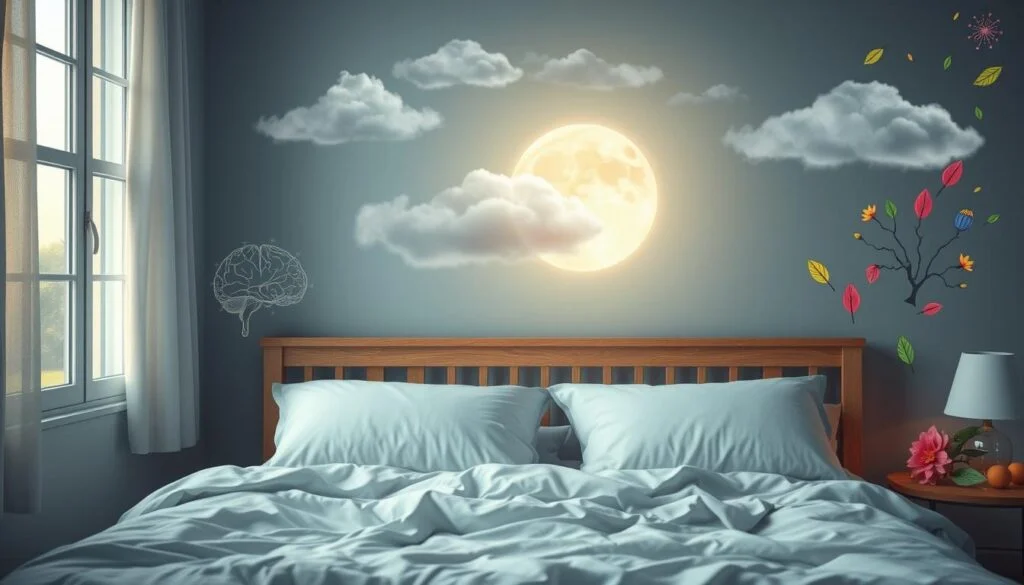The link between sleep and mental health is complex. Good sleep is key for emotional health, thinking clearly, and staying strong mentally. But, mental health issues can mess with sleep, starting a tough cycle to stop.
It’s vital to understand how sleep and mental health are connected. This knowledge helps us find ways to improve both physical and mental health. This article will look into the science behind this connection. We’ll explore sleep disorders and how to manage them for better sleep and mental health.

Key Takeaways
- Sleep and mental health are closely intertwined, with each one significantly influencing the other.
- Quality sleep is essential for maintaining emotional regulation, cognitive function, and overall psychological well-being.
- Common sleep disorders, such as insomnia and sleep apnea, can have serious implications for mental health.
- Addressing sleep issues can be an effective strategy for managing various mental health conditions, including depression and anxiety.
- Adopting natural sleep-enhancing techniques can contribute to improved mental well-being and resilience.
Understanding the Crucial Link Between Sleep and Mental Health
The link between sleep and mental health is complex. At the biological foundation, sleep is key for our brain’s functions and emotions. These are vital for our overall wellbeing.
The Biological Foundation of Sleep-Mental Health Connection
When we sleep, our brain works hard. It solidifies memories, regulates our mood, and refreshes our brain. Sleep also helps keep our circadian rhythms in check. This affects our mental and physical health a lot.
Key Brain Mechanisms During Sleep
- Memory consolidation: Sleep makes new information stick, boosting our mental clarity.
- Emotional regulation: It helps manage our emotions, lowering mood disorder risks and boosting emotional strength.
- Neurological restoration: Sleep recharges our brain, getting it ready for top performance and mental health.
Understanding sleep’s role in our brain helps us see its importance. It’s key for mental health and cognitive function.
The Science Behind Sleep’s Impact on Emotional Regulation
Getting enough sleep is key for keeping our emotions in check. Many studies show how sleep quality and duration affect our mood. They help us manage our feelings better.
While we sleep, our brain sorts through information and strengthens memories. This process is vital for controlling our emotions. But, sleep deprivation messes with this balance, harming our mental wellbeing.
The Neurobiology of Sleep and Emotion
Sleep helps our limbic system, which handles emotions, work right. The amygdala, a key part of this system, gets too active when we’re tired. This makes it harder to control our emotions.
Also, sleep-deprived people’s prefrontal cortex doesn’t work as well. This area helps us manage our feelings. Without it, we feel emotions more strongly and have trouble regulating them.
- Sleep deprivation makes it hard for the brain to handle emotions.
- The amygdala gets too active, causing stronger emotional reactions.
- The prefrontal cortex, which helps control emotions, works less when we’re tired.
| Metric | Well-Rested Individual | Sleep-Deprived Individual |
|---|---|---|
| Amygdala Activity | Balanced | Hyperactive |
| Prefrontal Cortex Activity | High | Decreased |
| Emotional Regulation | Effective | Impaired |
Studies show that sleep deprivation greatly affects our emotional control. So, it’s important to keep a good sleep routine. This supports our mental wellbeing and keeps our emotions stable.
“Sleep is the golden chain that ties health and our bodies together.” – Thomas Dekker
Common Sleep Disorders and Their Mental Health Implications
Sleep disorders can deeply affect mental health. Issues like insomnia and sleep apnea can lead to anxiety and depression. It’s important to understand how sleep disorders and mental health are connected.
Insomnia and Mental Health
Insomnia makes it hard to fall or stay asleep. People with insomnia often feel more anxiety and depression. Lack of sleep can harm their emotional health.
The link between insomnia and mental health is complex. Each problem can make the other worse, creating a cycle.
Sleep Apnea and Mental Health
Sleep apnea, where breathing stops during sleep, is linked to mental health issues. Those with sleep apnea may feel more depression and anxiety. Disrupted sleep can cause fatigue, mood changes, and thinking problems.
| Sleep Disorder | Mental Health Impact |
|---|---|
| Insomnia | Increased anxiety and depression |
| Sleep Apnea | Higher rates of depression and anxiety |
| Restless Leg Syndrome | Associated with depression and anxiety |
| Circadian Rhythm Disorders | Linked to mood disorders and cognitive impairments |
Other sleep disorders like restless leg syndrome and circadian rhythm disorders also affect mental health. Treating these sleep issues is key to better mental health.
“The quality of sleep has a direct impact on our mental health, and addressing sleep disorders can be a significant factor in improving overall psychological well-being.”
Understanding the connection between sleep and mental health is crucial. It helps individuals and healthcare providers tackle both physical and mental health issues. Getting the right treatment and practicing good sleep habits can greatly improve mental health.
How Insomnia Affects Mental Wellbeing
Insomnia is a common sleep disorder that makes it hard to fall or stay asleep. It deeply affects a person’s mental health. Knowing how insomnia impacts our minds is key to solving this widespread problem.
Short-term Mental Health Effects
People with insomnia face many short-term mental health issues. Lack of sleep can make them irritable and moody. It also makes it tough to focus and think clearly.
Insomnia can make anxiety worse and even lead to depression. It’s a big challenge for those who struggle with it.
Long-term Psychological Impact
Long-term insomnia can really hurt our mental health. It can increase the risk of serious mental health problems like depression and anxiety. It also makes it harder to manage mental health issues that already exist.
Dealing with insomnia can create a cycle of stress and frustration. This cycle can weaken our mental strength and lower our quality of life. It’s important to tackle insomnia to keep our mental health strong.

| Short-term Effects | Long-term Effects |
|---|---|
| Increased irritability Mood swings Difficulty regulating emotions Impaired concentration and cognitive performance Heightened anxiety Increased risk of depression | Increased risk of mental health disorders (e.g., clinical depression, anxiety) Exacerbation of existing mental health conditions Decreased psychological resilience Reduced overall quality of life |
Understanding insomnia’s effects on mental health helps us and healthcare workers fight sleep problems. This fight is crucial for better mental health.
Depression and Sleep: A Complex Relationship
The link between depression and sleep is complex. Sleep disorders and mental health issues often go together. This creates a cycle that’s hard to break.
Depression can mess with sleep, causing insomnia and restless nights. People with depression might find it hard to fall or stay asleep. This can make their depression worse, starting a cycle.
What causes this link? It’s because of changes in neurotransmitters, hormones, and body rhythms. Sleep helps the brain regulate mood and function. When sleep is disrupted, it can lead to depression.
It’s key to understand that depression and sleep disorders affect each other. Treating sleep problems is important in mental health care. Better sleep can help with depression symptoms.
“The relationship between sleep and depression is complex, but understanding this connection is essential for developing effective treatment strategies.”
By tackling the connection between sleep and depression, people can improve their well-being. This can help break the cycle of mental health issues.
Anxiety’s Role in Sleep Disruption
Anxiety and sleep disorders are closely linked, creating a cycle that affects mental health. People with anxiety often find it hard to sleep or stay asleep. This lack of quality rest can make anxiety worse, starting a cycle.
Breaking the Anxiety-Sleep Cycle
To stop this cycle, treating both anxiety and sleep issues is key. Cognitive-behavioral therapy (CBT) is effective for both. It helps change negative thoughts and behaviors that lead to sleep and anxiety problems.
Management Strategies
CBT is not the only way to manage anxiety and sleep. Here are other strategies:
- Go to bed and wake up at the same time every day to establish a routine.
- Stay away from blue light from screens before bed to keep your sleep cycle natural.
- Try relaxation techniques like deep breathing, meditation, or progressive muscle relaxation to calm down.
- Regular exercise can help reduce anxiety and improve sleep.
- Don’t consume caffeine or nicotine close to bedtime.
By tackling anxiety and using sleep management strategies, people can overcome sleep problems caused by anxiety. This improves their mental health overall.

The Impact of Sleep Deprivation on Cognitive Function
Adequate sleep is key for our brain to work well. But, our fast-paced lives often mean we don’t get enough sleep. This leads to sleep deprivation, affecting our mental skills. It’s vital to understand how sleep impacts our mental health.
Not sleeping enough messes with our brain. It makes it hard to remember things, focus, and make good choices. Sleep deprivation can make simple tasks tough.
Just one bad night’s sleep can hurt how well we think. Long-term sleep deprivation makes it even harder to focus and make smart choices. It also raises the chance of accidents.
| Cognitive Function | Impact of Sleep Deprivation |
|---|---|
| Memory | Impaired ability to consolidate and recall information |
| Attention | Reduced focus and concentration |
| Decision-making | Impaired judgment and problem-solving skills |
| Reaction Time | Slower response times, increasing the risk of accidents |
To keep our brain sharp, we need to value sleep. Fighting sleep deprivation and adopting good sleep habits boosts our mental health. It helps us think, learn, and do our best.
Natural Methods to Improve Sleep Quality for Better Mental Health
Getting good sleep is key for your mental health. You can boost your sleep and mental wellbeing with natural ways. Start by matching your sleep schedule with your body’s natural rhythm.
Make your bedroom sleep-friendly. It should be dark, cool, and quiet. Avoid bright lights and loud noises. A calming bedtime routine, like reading or yoga, helps your body relax.
Also, regular exercise during the day helps sleep. It lowers stress and anxiety, making it easier to sleep. Try herbal teas, essential oils, or relaxation methods to find what works for you.
FAQ
What is the connection between sleep and mental health?
Sleep and mental health are closely linked. Good sleep helps keep our minds healthy. Bad sleep can lead to depression, anxiety, and brain problems.
How do sleep disorders affect mental health?
Sleep disorders like insomnia and sleep apnea harm our mental health. They can cause depression, anxiety, and brain issues.
What is the link between insomnia and mental wellbeing?
Insomnia can hurt our mental health in many ways. It can make us feel moody, irritable, and hard to focus. Long-term insomnia can also lead to depression and anxiety.
How does depression affect sleep patterns?
Depression and sleep problems go hand in hand. Depression can make it hard to sleep well. Bad sleep can also make depression worse.
What is the role of anxiety in sleep disruption?
Anxiety can mess up our sleep. Worries and tension make it hard to sleep. Poor sleep can make anxiety worse. It’s important to find ways to break this cycle.
How does sleep deprivation impact cognitive function?
Not getting enough sleep hurts our brain. It can make memory and focus worse. Good sleep is key for a healthy brain.
What are some natural methods to improve sleep quality for better mental health?
To sleep better and feel better mentally, try these tips. Stick to a sleep schedule, relax before bed, and avoid screens. Manage stress and make your sleep space comfy. Listening to your body’s natural rhythms can also help a lot.





